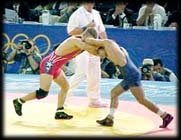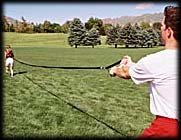Here is a case study of a wrestler who wanted to improve power out of the bottom position and to improve quickness off the whistle and the opponent's movements.
This program is designed to work on your reaction time and defensive power. These exercises can be done throughout your workouts and some may require a partner. Some of the exercises will have you working on your bottom position and getting to your feet. They will be specific to what you do in a match because some of the best ways to train are to complete the moves you may have weaknesses in. That way you will specifically strengthen those moves.
The power exercises should be done about every 2-3 days. Just take at least a day off in between workouts or put them with your strength training or power day. The power development exercises should be done with explosiveness and speed. The reaction drills can be done every other day. Some of these drills you react from the partner's first movement. This will help you react to the whistle, but more importantly help you defend any movement initiated by the challenger. Rest about 1-2 minutes between sets with all power exercises.
The reaction drills only need about 30 seconds between sets. Stay fresh and focus on quality with all exercises:
The Routine
Reaction Drills
- Two point stance drill 3 sets x 10 reps
- Tennis Ball Drop 3 sets x 10 reps
- Wrestlers Get Up 6 sets x 10 reps
- Turnovers 3 sets x 10 reps
- Hand-Eye Ball Drops 3 sets x 10 reps
- Take Downs 3 sets x 10 reps
Power Drills
- Wrestlers Get-Ups with resistance 3 sets x 6 reps
- Underhand Throw with medicine ball 3 sets x 5 reps
- Chest Pass with medicine ball 3 sets x 8 reps
- Backward Throw with med. ball 3 sets x 8 reps
- Power Drop with med. ball 3 sets x 8 reps
- Three point stance with hurdle jump 3 sets x 5 reps
- Take Downs with resistance cord 2 sets x 5 reps
 Click Here For A Printable Log Of The Routine!
Click Here For A Printable Log Of The Routine!
Exercise Descriptions
Wrestlers Two-point Stance Drill

- Assume a standing defensive position with your hands it front of you.
- Have partner or trainer stand 5 feet away with a tennis ball. Toss ball at the athlete's legs or waist. React to the ball and at least block it with a hand or catch it before it hits you. The partner can throw the ball harder and quicker if the athlete can catch it comfortably.
- Repeat according to prescribed repetitions.
Tennis Ball Drop
- Have partner or trainer stand 10 feet away holding a tennis ball in each hand out to the sides at shoulder height.
- You stand with one foot in front of the other in the "ready" position.
- Partner will drop one of the tennis balls (his or her choice). You must sprint toward the ball before it bounces twice.
- Return to start point and repeat according to prescribed repetitions.
- Remember to drive on the first step and not "stutter step" to reduce reaction time.
Wrestlers Get Up
Wrestler starts in the down position with a partner on top. The partner says go and the wrestler gets up to his feet as fast as possible. The partner provides about 10-20% resistance. The athlete focuses on speed and explosion so pop out of that bottom position with a lot of power until you get to your feet.
Turnovers
Athlete 1 starts with palms up and arms extended out if front of them. Athlete 2 places their hands over athlete 1's but not touching, athlete 1 now tries to slap the top of athlete 2's hands. When athlete 1 misses then switch positions.
Hand-Eye Ball Drops
Athlete 1 starts with their hands at hip height in front of their body and their palms facing down. Athlete 2 now places a tennis ball just above and between athlete 1's hands and then drops it. Athlete 1 must react and catch the ball, with only one hand, before it hits the ground. Athlete 1 cannot turn their hand over, the palm must be facing down all the time. Make sure to use both hands equally. To make this more challenging try dropping the ball from below athlete 1's hands to enlist faster motion
Take Downs
Athlete starts in their 2-point stance facing a partner also in a 2-point stance. The partner initiates movement and shoots in for a take down. Athlete needs to defend and react and prevent the partner from getting their arms around the athlete's hips or legs. If the partner is able to grab a leg or hips then they win. Repeat from the start. Athlete wins if they get their hands in front to block the take down attempt and prevents any gain of control from the partner.
Wrestlers Get Up (With resistance)
- Wrestler starts in the down position with a partner on top.
- The partner says go and the wrestler gets up to their feet as fast as possible. The partner provides about 70-80% resistance. The athlete focuses on speed and explosion so pop out of that bottom position with a lot of power until you get to your feet.
Underhand Throw
- Stand in quarter-squat position with trunk flexed forward and ball held between legs. Arms should be slightly bent.
- Have a partner or trainer stand approximately 10-15 yards away.
- Perform underhand toss as far as you can, using the legs to explode up.
- Have partner catch ball on the bounce and return the ball. Athlete should catch ball after a bounce and repeat as prescribed. Variations - single leg underhand throw.
Chest Pass
- Stand with feet slightly wider than hip-width apart. Knees should be slightly bent.
- Hold medicine ball to chest and pass forward as far as possible to a partner or trainer.
- Catch ball on the bounce from your partner and repeat according to prescribed repetitions.
Sports Application - explosive push-off with arms
Variations - single leg throw, seated with back supported, seated on stability ball
Backward Throw
- Stand with feet slightly wider than hip-width apart. Have a partner or trainer stand approximately 10-15 yards behind you.
- Grasp ball and lower body into a semi-squat position. Explode up extending the entire body and throwing medicine ball up, over and behind the body.
- The goal is to throw the ball behind you as far as you can and generate most of the power in the legs.
- Catch ball on the bounce from your partner and repeat according to prescribed repetitions.
Variations - single leg, seated on stability ball.
Power Drop
- Assume back-lying position on ground with arms extended up over chest. Partner or trainer stands on box behind your head holding the medicine ball at arms length.
- Partner or trainer drops ball toward hands.
- Catch medicine ball and immediately propel the ball back to partner or trainer. 4. Repeat according to prescribed repetitions.
Sports Application - explosive push-off of arms
3-Point Stance with Single Leg Hurdle Hop
- Assume a 3-point stance position with the hurdle 2-3 feet in front of you.
- Explode up and over the hurdle by pushing off the forward foot. Other leg should be driven up to help clear hurdle.
- Land on both feet and repeat according to prescribed repetitions.
Sports Application - blocking, explosive starts from three point stance
Take Downs with resistance cord  Athlete starts in their 2-point stance with a resistance cord around their waist facing a partner also in a 2-point stance. A third partner provides the resistance behind the athlete holding the resistance cord. The athlete initiates movement and shoots in for a take down. Partner needs to defend and react and prevent the athlete from getting their arms around the partners hips or legs. If the athlete is able to grab a leg or hips then they win. Repeat from the start.
Athlete starts in their 2-point stance with a resistance cord around their waist facing a partner also in a 2-point stance. A third partner provides the resistance behind the athlete holding the resistance cord. The athlete initiates movement and shoots in for a take down. Partner needs to defend and react and prevent the athlete from getting their arms around the partners hips or legs. If the athlete is able to grab a leg or hips then they win. Repeat from the start.
Partner wins if they get their hands in front to block the take down attempt and/or prevents any gain of control from the partner.
